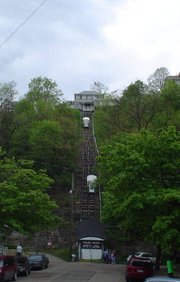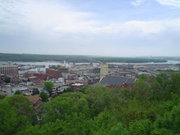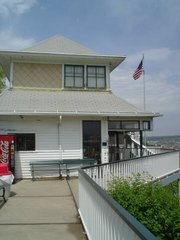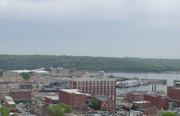Fourth Street Elevator
|
|
4thElevator2.jpg
The Fourth Street Elevator is located in Dubuque, Iowa. Also known as the Fenelon Place Elevator, it is the shortest and steepest railroad in the world. The elevator is listed in the National Register of Historic Places.
| Contents |
Location
The elevator is located at 512 Fenelon Place, Dubuque, Iowa. The entrance to the elevator is located at the western end of Fourth Street in Dubuque.
At the top there are two observation decks. These decks offer a commanding view of the downtown Dubuque area. Three states can be seen from the observation decks - Iowa, Illinois, and Wisconsin.
The elevator
The elevator is 296 feet (90 m) long, with a vertical elevation of 189 feet (58 m). The elevator is funicular in design. There are two cars that always start out opposite each other, and pass each other at the mid-point of the elevator. The two cars in the cable-driven railway are powered by an engine in the station house at the top of the hill. The engine only needs to overcome inertia and compensate for the varying weight of the passengers in the cars. Because the design is funicular, the cars counterbalance each other, and it's the weight of the two cars that does much of the work in moving them back and forth. The weight of the car going down the bluff helps pull the other car at the bottom up to the top.
The elevator is run from April 1st to November 30th. The hours are from 8 am to 10 pm. The elevator web site lists the current rates (http://www.dbq.com/fenplco/prices.html).
History
The original 4th Street Elevator
In 1882, Dubuque was an hour and a half town in that everything shut down in town for that amount of time during the lunch hour. J.K. Graves, an area banker who was a former Mayor and State Senator lived at the top of the bluffs. His office, however was at the bottom of the bluffs. He would go home during the lunch hour, however the trip would take at least half an hour. He liked to eat then take a brief nap, but as he only had 30 minutes he found doing both impossible.
So he came up with the idea of building a railroad from the bottom to the top of the bluff. He approached the city for permission to build an elevator, which was granted. Graves hired John Bell, a local engineer, who built an elevator modeled on those from the Swiss Alps. Originally, the cable car, which was built for Mr. Graves' private use, was in a plain wood building, with a coal-fired steam engine boiler and winch. A Swiss style car was lowered up and down on two rails by a hemp rope.
The cable car operated for the first time on July 25 1882. Graves would have his gardener let him down in the morning, pull him back up at lunchtime, let him back down after lunch and a nap, and finally pull him back up at the end of the day. Soon neighbors began asking Graves for rides.
The second 4th Street Elevator
On July 19 1884, the boiler exploded, and the elevator burned. Graves rebuilt the elevator. Because the elevator was popular with the neighbors, Graves decided to open it to the public, and charge admission for rides. The elevator operated for the next several years.
The present elevator
But in 1893 the elevator burned again. This time, with a recession going on, Graves couldn't afford to rebuild the elevator. However, his neighbors had come to depend on the elevator to help them go to work, church, school, and shopping.
A group of ten neighbors banded together and formed the Fenelon Place Elevator Company. Graves gave them the franchise right of way for the track. The group went to the 1893 World Columbian Exposition in Chicago, Illinois to look for new ideas. The group brought a streetcar motor to run the elevator, the turnstile, and steel cables back with them.
They decided on a two car system that was funicular, or counterbalanced. They installed two sets of steel rails, with a bypass in the center to allow the cars to pass each other. They decided to use steel cables because when the elevator had burned in the past, the fire had burned through the hemp ropes. This caused the car to fall and crash into the little house at the bottom, destroying both.
4thElevator1.jpg
C.B. Trewin, who lived near the elevator eventually became the sole stockholder. He did this by purchasing up the stock of the others as they died or moved away. Trewin expanded the operator's house by adding garages on both sides of it. He also built a second-floor apartment, which became a meeting place for neighborhood men so that they could smoke and play cards away from their wives.
As the automobile gained in popularity, the elevator became much less of a daily necessity for neighbors, and instead became a unique part of the city. In 1962, there was another fire. However this one only damaged parts of the operators house. After repairs, the price finally went up to ten cents a ride.
Another elevator similar to the 4th Street Elevator was operated at 11th Street for a number of years. However, this elevator was never as popular or as successful as the one at 4th Street, and it was eventually dismantled.
The elevator underwent major renovations in 1977. The two cars were completely rebuilt. Also the original gear box, which was 84 years old, was replaced by a modern DC gear box.
The movie F.I.S.T., which starred Sylvester Stallone and was largely filmed in Dubuque, included a scene that was filmed at the elevator.
External links
- The Fenelon Place Elevator Company Site (http://www.dbq.com/fenplco)
Other images
4thElevator3.jpg
4thElevator6.jpg




